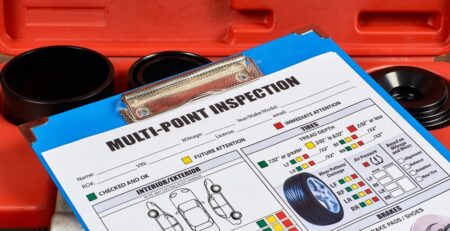Essential Features to Look for in a Dealership Management System (DMS)
As a dealership, choosing the right DMS is a big decision. The right system should align with your business needs, ensuring responsiveness to market demands and optimizing dealership performance. However, traditional DMS platforms often have limitations that hinder efficiency and real-time communication. This is where many businesses look into dealership software extensions to get precisely what they need.
Workflow 360°’s DMS extension enhances the capabilities of your existing DMS to create a seamless, fully integrated dealership operation.
The Role of a Dealership Management System
A DMS acts as the nerve centre of a dealership, connecting various departments such as sales, finance, service, and parts. It automates processes and integrates these departments to manage operations efficiently, enhance productivity, and elevate customer experiences. An efficient DMS system allows for easy inventory tracking, sales performance monitoring, report generation, and workflow optimization.
The Importance of Selecting the Right DMS
Choosing the right dealership management system is more than just a technological investment; it’s a strategic decision that can significantly impact your dealership’s efficiency, customer satisfaction, and profitability. The right DMS system with these key features can transform your dealership’s operations, making it more responsive to market demands and customer needs.
How to Choose the Right DMS
Assess Your Dealership’s Needs
First and foremost, evaluating your dealership’s unique requirements and objectives is essential. Consider:
- The size of your dealership – Small, medium, and large-scale operations require different levels of functionality.
- Specific dealership processes – Identify which areas of your dealership need improvement, such as sales, inventory management, finance, or customer relationship management.
- Integration requirements – Determine whether the DMS needs to integrate seamlessly with other systems you use, like accounting software or customer relationship management tools.
- Compliance and reporting needs – Ensure that the DMS complies with industry regulations and can generate the necessary reports for your business.
Choose Between Cloud-Based and On-Premises DMS
Once you’ve assessed your dealership’s needs, you’ll need to decide between a cloud-based or on-premises DMS. Each has its own advantages:
- Cloud-based DMS: These systems offer flexibility, scalability, and remote accessibility. These can be a cost-effective choice for smaller dealerships with limited IT resources. Cloud-based DMS solutions also receive automatic updates, reducing the burden on your IT staff.
- On-premises DMS: If your dealership has specific security requirements, or you prefer to have complete control over your data and infrastructure, an on-premises DMS might be a better fit. However, they can be more expensive to set up and maintain.
Vendor Reputation and Support
When choosing between different DMS vendors, reputation matters. Look for vendors with a strong track record in the automotive industry and a history of providing quality DMS solutions. Research customer reviews and ask for references to get an idea of the vendor’s level of customer support. A responsive support team can make a big difference when issues arise, or assistance is needed.
A vendor’s track record in the automotive industry strongly indicates their suitability. Companies that have successfully provided DMS solutions to automotive businesses have likely encountered and resolved industry-specific challenges. They are more likely to deeply understand the unique needs and workflows of automotive organizations. This experience can result in a smoother implementation process and a DMS that aligns seamlessly with your business processes.
Furthermore, a history of offering quality DMS solutions speaks volumes about a vendor’s commitment to delivering reliable and effective products. It demonstrates their ability to adapt to evolving technological landscapes and provide solutions that meet or exceed industry standards. A reputable vendor is more likely to invest in research and development, ensuring their DMS remains cutting-edge and relevant.
User-Friendly Interface
A user-friendly interface is critical for staff adoption and efficiency. The DMS should be easy to navigate and intuitive, allowing your team to quickly learn and utilize the system without excessive training.
When we say a DMS should have an intuitive and easy-to-navigate interface, we’re essentially emphasizing the need for simplicity and clarity in design. This means that the layout should be organized logically, with menus, buttons, and features placed where users would naturally expect to find them. Icons and labels should be clear and self-explanatory, minimizing any potential confusion.
By ensuring that the DMS is intuitive, you’re effectively reducing the learning curve for your team. They should be able to start using the system with minimal training, if any at all. This saves time and money that would otherwise be spent on extensive training programs and allows your staff to transition smoothly into using the DMS in their day-to-day tasks.
Scalability
Your dealership may grow over time, so selecting a DMS that can scale with your business is essential. Whether you’re opening new locations, expanding your services, or increasing your customer base, your DMS should accommodate your evolving needs.
One of the most significant benefits of a scalable DMS is its adaptability to accommodate the increased volume of documents and data that comes with growth. Whether it’s sales records, service histories, or customer information, a scalable DMS can handle the influx without sacrificing performance or compromising data integrity. This ensures that your operations remain efficient and streamlined even as the volume of information expands.
Moreover, a scalable DMS provides flexibility in terms of user accounts and permissions. As your dealership grows, you may need to onboard new staff members or grant access to additional stakeholders.
Cost and ROI
Finally, the cost of the DMS and the potential return on investment (ROI) should be considered. While a DMS is an investment, it should provide value through increased efficiency, better customer experiences, and improved profitability. Evaluate the pricing model, ongoing maintenance costs, and any additional expenses.
While some DMS solutions offer many advanced features, it’s important to consider whether these features align with your dealership’s specific needs. While these extra functionalities may look impressive on paper, they might not add significant value to your operations and can cost you more money than necessary. Prioritize functionality that directly supports your core processes rather than getting dazzled by flashy but ultimately unnecessary features.
Why Workflow 360°’s DMS Extension is Essential
While traditional DMS platforms provide core functionalities, they often lack the flexibility and efficiency required to handle the fast-paced nature of modern dealerships. Workflow 360° offers a powerful DMS extension that enhances communication, efficiency, and profitability by eliminating workflow bottlenecks and improving interdepartmental collaboration.
Key Advantages of Workflow 360°’s DMS Extension:
- Real-time communication: Instantly notifies relevant departments about approvals, service progress, and inventory updates.
- Enhanced reporting: Provides actionable insights and live tracking, allowing managers to make informed decisions faster.
- Workflow automation: Reduces manual data entry and administrative burdens, streamlining dealership operations.
- Seamless integration: Works with your existing DMS, eliminating the need for a complete system overhaul while adding significant functionality.
Book a Demo Today
Discover how Workflow 360° can enhance your Dealership Management System and improve efficiency across all departments. Contact us for a demo and take your dealership’s operations to the next level.











